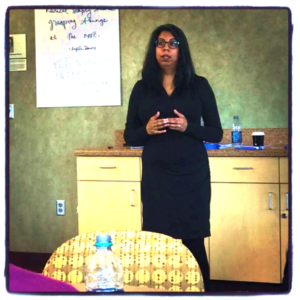Bina M. Patel of Saathi Impact Consulting and former PLACES fellow shares some brief tips on doing racial equity work from her module at the PLACES alumni gathering at The Funders’ Network 2017 Conference in Saint Paul, Minneapolis.
The point of self-care is to create the conditions for you to continue taking action towards progress everyday – to keep coming back. Self care is about creating resiliency in service of a greater good.
-Bina M. Patel
 1. Be mindful of the space: Do you sit at a table with leadership at the front? Could you disrupt the power setup with a circular table or a different space that can disrupt the centered whiteness paradigm? This is a simple way to breakdown the power dynamic that most of us experience when we walk into a room or meeting. Another simple way is to ask ourselves, “How do we respond to emails or to those speaking up in meetings? Could we respond in a way that does not perpetuate systems of power? Also, am I perpetuating systems of power myself with how I interact and work with those around me?” While practicing compassion and self-care is imperative, it is also crucial not to normalize or enable inequity and racism—and this includes not only questioning those in power, but ourselves.
1. Be mindful of the space: Do you sit at a table with leadership at the front? Could you disrupt the power setup with a circular table or a different space that can disrupt the centered whiteness paradigm? This is a simple way to breakdown the power dynamic that most of us experience when we walk into a room or meeting. Another simple way is to ask ourselves, “How do we respond to emails or to those speaking up in meetings? Could we respond in a way that does not perpetuate systems of power? Also, am I perpetuating systems of power myself with how I interact and work with those around me?” While practicing compassion and self-care is imperative, it is also crucial not to normalize or enable inequity and racism—and this includes not only questioning those in power, but ourselves.
2. Bring compassion: One of the best tools to bring to the “table” is compassion. You are not being asked to get into the head of an aggressor, , but you can intentionally bear witness to their story—from a safe distance. Humanizing those around us builds bridges of honest dialogue. It is not necessary to self-traumatize for the sake of empathy. It is in the practice of not “othering” the aggressor that we allow ourselves to not to engage in their narrative, but also disrupt the power dynamic.
3. Generosity: Generosity is the spark for empathy. Find moments where you can be more generous—with yourself and with others. Invest in starting conversations versus making statements. Remember to give how you can in that moment—not how you are expected to or even sometimes how you would want to but cannot. It is also ok to be generous with yourself and take a moment to process information or a situation. In trying times, it is important that we find ways to replenish our empathy cup. It is what allows us to humanize others.
4. Self-care: Self-care is creating conditions for you to take repeated action. Resliency is the ability to keep going back to do the work. Resiliency is gained by purposeful self-care. This includes broader practices like having a supportive community and an equity toolkit at your disposal to individual practices like sleeping well, practicing mindfulness and meditation, and saying no when you need to. Self-care is different for every individual, but it is necessary for all. This also means acknowledging trauma responses such as fear, guilt, complaining, disassociating, and vices for what they are.
5. Choice Points: We make lots of choices, some that continue our complicity in the system. Looking our own choices allows us to be intentional about making different decisions that move us closer to equity – in big and small ways. A critical part of making choices towards equity is RISK. First, assess the situation. Then, try to manage the risk with equity tools and relationships, then, try to mitigate by finding new alternatives. Also, ask, why are we making certain decisions? What are the results we want? What is the mission? Do we have metrics and reasons behind our decision making and practices? Is is aligned to our equity principles?
In closing, wise words from Audre Lorde: “Caring for myself is not self-indulgence, it is self-preservation, and that is an act of political warfare.”
We look forward to sharing more tips and insight on doing racial equity work in 2017 through upcoming learning calls, blog posts, and social media. We invite you to join us on this shared learning experience. Stay tuned!
